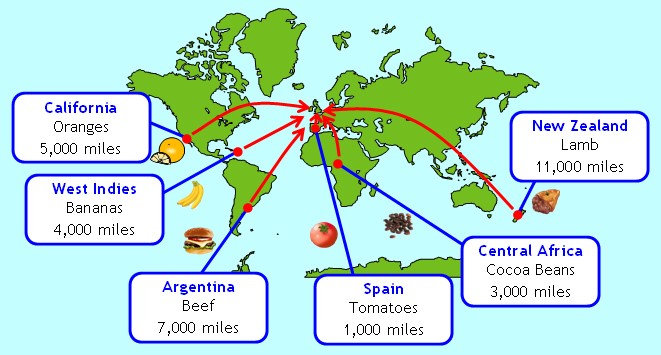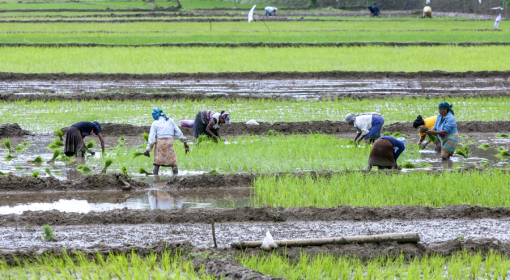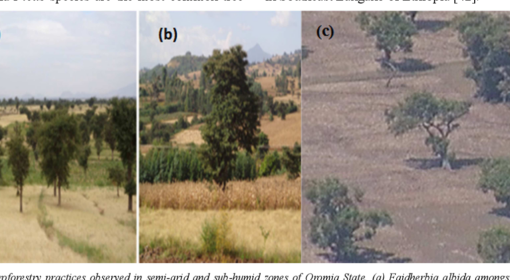Food Miles
Posted by Mekdelawit Messay Deribe
December 18,2017
Food Miles. Does it ring any bells? If yes, great! If not let’s explore it together. Food miles is the distance your food has to travel from the farm to reach your plate. But why should we care how far our food travelled? Because the further your food travels- the more greenhouse gas(GHG) emissions it will produce. Now you might be saying “ really, is that even a thing?” – Just look at the figures below!
If you are living in the US, you are probably buying
- Olives which have travelled more than 8000km from Italy,
- Shrimps, cherries, berries, grapes, and lime which travelled around 8200 km from Chile or
- Garlic and Mandarin from China which traveled almost 12000 km to reach you.
Do you live in Europe say in London?
- Your coffee traveled more than 8700km from Ethiopia,
- Bananas usually came from Colombia which is more than 8300km from London
- Bell Pepper from Israel travel 3600km to reach London
- A can of tuna from Thailand travels 9500km to London and
- Onions from Egypt travel more than 3500km to reach you.
You did not think your food traveled so much did you! Food which is not in season also has a large GHG emission as it has to be transported large distances from places where it is in season to reach you. For example when oranges are out of season in Australia, they are just coming in season in the US and travel more than 10,000kms to reach Australia. Transporting just 2kg of oranges from California to Sydney would release more than its own weight in GHG emissions. Growing out of season produce locally using green houses would also take up lots of energy adding to GHG/ carbon emission especially if the energy source is not renewable. Food transport worldwide is quite literally responsible for millions of tons of GHG emissions annually.

Now that we have established that “food miles’ is a serious issue, what can we as responsible global citizens do about it. Well, a very simple solution would be to buy organic, locally produced and seasonal produce. Research indicates that consumers can get plenty of food within 160 km(100 miles) of where they live. By buying local and seasonal produce you significantly reduce your food miles and consequently reduce energy use and GHG emissions. Local produces are usually organic, so you also cut down your exposure to pesticides and other preservative chemicals those exotic produce have to be treated with.
But obviously there are counter arguments to this buy local movement. One of the most strongly voiced opinions is that buying non-local produce actually helps developing nations as long as fair trade policies are followed. Strictly buying local produce will deprive export-dependent struggling economies of their major source of income. I find this argument very compelling. Especially coming from a developing country I understand that some countries have economies highly dependent on food export. For instance, Ethiopia is the largest coffee exporter in Africa and the fifth largest producer in the world, with coffee accounting for more than 40% of its export and 10% of its annual revenue. For such economies it is easy to see how the buy local movement can be a predicament. People also raise other reasons on a personal level which make buying local difficult for them. These include reasons such as:
- Local produce is usually more costly,
- People enjoy exotic taste,
- Country of origin labels are not usually displayed on food packaging which makes it hard to choose local produce,
- It is hard to know what is in season and what is not,
- Locally packaged food may have non-local ingredients,
- It is difficult to distinguish between locally grown and locally processed or packaged food,
- Local produce might not be organic. Is it not better to buy organic food from far than organic food locally?
- I cannot think of all this while shopping in real life,
- Food miles are the least of our worries in the fight against climate change etc…
Despite the legitimacy of some these claims, I still want to do my part in reducing emissions and I believe most people do too. But does this mean I am never going to have another pineapple or banana again!!!??? Personally this is a huge dilemma for me. However, being informed always helps. The small changes we make have a snow ball effect. If we could be conscious of our decisions and how they affect the environment then I believe we can find a margin of moderation where I do not have to give up my pineapple and still be environmentally responsible. I believe it is all about moderation. Markets respond to the public demand. So for starters we can demand for better labels on country of origin to make the decision easier for us. We can also take advantage of several websites out there which show consumers what is in season and local food markets close by so consumers can easily make informed decisions while shopping. Pairing these actions with other environmentally good practices such as reducing your meat consumption(Yes- a single hamburger takes 2500 litres of water for its production) and reducing food waste we can make a significant difference. You can also support local farmers and community supported agriculture initiatives(CSA) to produce organic food locally! If you want to learn more about CSA initiatives follow this link to see how one such organization operates. If you want to learn more about food miles follow this link and this one.



